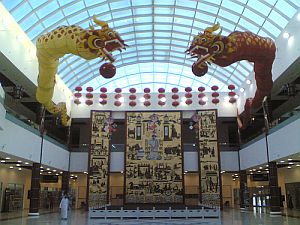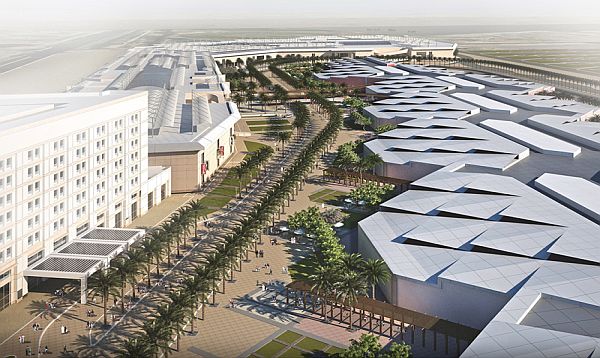Cancun, Mexico - Construction of the second biggest retail complex for Chinese products outside China will begin in Mexico next month despite environmental and business concerns, a project leader said last week.
The Dragon Mart will be built in a natural reserve near the beach resort of Cancun in eastern Mexico, with more than 3,000 retail spaces plus offices and 722 residences for employees within a 1,376 acre area.
Pushed by Chinese businessman Hao Feng, it will be the second Dragon Mart ever built, after a similar, bigger complex opened in Dubai in 2004.
"Why Dragon Mart in Latin America? China is one of the countries with the largest, sustained growth in the past 10 years and Mexico and Latin America must consider east-west trade in addition to north-south trade," Juan Carlos Lopez, director general of the project, told a news conference.
Some 4,500 Chinese companies are interested in selling their products at the oriental style shopping center, which could draw one million visitors and $700 million a year, Lopez said.
But environmental groups are concerned that the project will cover more than 1000 acres of a natural reserve. Despite all of the urban and ecological laws of Benito Juarez district and without permission from the Ministry of Environment and Natural Resources, the project has for about three months now began the deforestation of land in the vicinity of Puerto Morelos.
"It contravenes the municipality's environmental protection program," Alejandro Serrano, director of the Mexican Environmental Rights Center, states. "The law allows for 25 percent of vegetation to be torn from the area, but the project secured a permit to cut down 35 percent," Serrano said, denouncing a lack of transparency in the permit application process.
The company counters that the project is sustainable and was given the green light by the state of Quintana Roo, which is needed to obtain a building permit from the municipality.
 |
Mexican businesses are also worried. In addition to ecological impacts, allowing the construction of Dragon Mart in Quintana Roo would bring disastrous economic consequences for the domestic industry. It would be like 'giving the coup de grace' to the already affected Mexican industries by the invasion of underpriced and subsidized Chinese goods.
Mexico cannot compete with China for differences in energy costs, raw materials, labor, taxes, and many other variables. Nationally, the introduction of Chinese products has already caused serious impacts resulting in the loss of jobs and the closure of Mexican businesses.
Unlike the tourism industry, in which the Mexicans have access to a range of job opportunities at all levels, the strategic hub "Dragon Mart Cancun" would offer Mexicans only lower-income jobs, while the Chinese foreigners would have access to all the benefits of economic investment and even housing, benefits that in no way Mexicans will have access to.
This strategy is no stranger to the state enterprises in China. It is a proven model, repeated in more than twenty countries in which China has invested, always with disastrous social results. Whenever big government and Chinese consortia establish a "megaproject, dazzling, and promising" in a country (as happened in Peru, Argentina, Dubai, Kazakhstan, Burma,) it has left a disastrous social imprint on the local community. The hosts never receive the economic benefits of these projects, their natural resources are plundered and it creates poverty belts that increase dramatically, along with corruption, violence, and social inequality.
From a cultural standpoint, a project like the Dragon Mart will surely have a negative impact on the local population, irrevocably changing the idiosyncrasies and cultural environment of the place. Without downgrading any foreign nationality, the fact that thousands of families from China are to be "imported" into Mexico, will completely alter the social and cultural dynamics of the surrounding communities and threaten the cultural identity and the tourist attractions of the area.
Sources: SAPA/TheYucatanTimes.com


